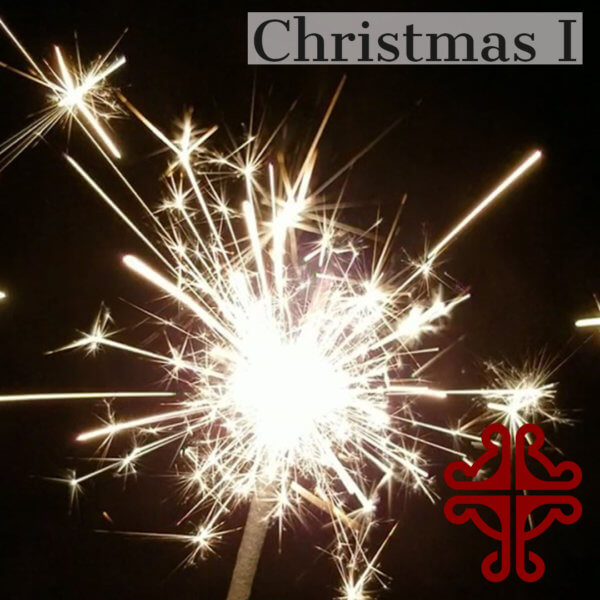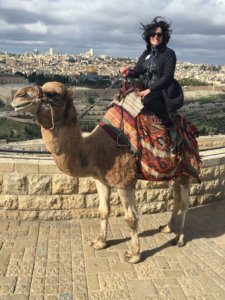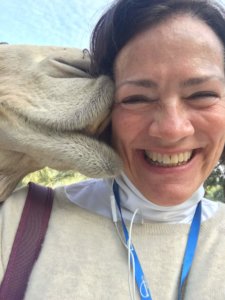
Found In Translation
 In the beginning was the Word, and the Word was with God, and the Word was God. He was in the beginning with God. All things came into being through him, and without him not one thing came into being. What has come into being in him was life, and the life was the light of all people. The light shines in the darkness, and the darkness did not overcome it.
In the beginning was the Word, and the Word was with God, and the Word was God. He was in the beginning with God. All things came into being through him, and without him not one thing came into being. What has come into being in him was life, and the life was the light of all people. The light shines in the darkness, and the darkness did not overcome it.
Those words have to be some of the most beautiful poetry anywhere, no matter what the language. Even if you’re not a philologist — a lover of language — or a poet, the sheer immensity of the idea just has to take you back. And it’s our gospel reading for today, so this passage from John’s gospel is being read — and preached on — all over Christendom today, at least in North America, and at least in the churches that follow the revised common lectionary.
Now, before I lose a bunch of you here — some of you may be worried that I’m going to talk about etymology, what’s lost in translation, and other kinds of word nerd stuff — I PROMISE you that this sermon will also feature camels, those intrepid ships of the desert — along with young love, prophecy, and strong women — so hang with me here. You don’t know when these other things might come up!
Word Nerd
So preachers all over the continent are preaching about translation today. In the beginning was the Word, and the Word was with God and the Word was God. Even though I love this language from the first chapter of John’s gospel, I always hear it as a bit of a puzzle. Because even as a lover of language — a kind of a word nerd — I tend to focus on the combination of letters it takes to spell WORD. Or the sound those letters make when we speak them. Whether in combination with other words they rhyme — or all start or end with the same sound.
As another way of saying this, I tend to think of words as instruments that carry meaning, rather than the location where all meaning starts: In the beginning was the Word, and the Word was with God and the Word was God. So I tend to hear that first sentence from the gospel of John as a brain teaser, but it draws me in.
Logos
As you know, John’s gospel was originally written in Greek. And Word — as in In the beginning was the Word — comes to us from the Greek word Logos. Philosopher/blogger Justin Taylor explains that in ancient Greek, Logos has many meanings, but none of those meanings pointed directly to a collection of written letters or spoken sounds like our English Word. The biblical Greek LOGOS meant something bigger than a handful or two of letters of the alphabet, or even a 50-cent word’s-worth of sounds.
LOGOS, from the biblical Greek, referred to the power of reason, the natural order of things, and the principle of relation, and harmony, which exists both within the natural fabric of the universe and within the human mind. The idea of LOGOS in a cosmic sense encompassed all of these meanings and refers to the underlying Order of the Universe, the blueprint on which all creation is based. In short, LOGOS refers to the mind and order of God. The author of John’s gospel is saying that in the beginning with God was NOT a human or fleshly man but a harmony and natural order of everything.
Not long ago at all — in the Fall of 2018 — renowned scholar David Bentley Hart published what a reviewer in The Atlantic called a mind-bending translation of the New Testament. Hart called the translation of LOGOS as the Word “a curiously bland and impenetrable designation for the heady concept expressed in the original Greek of the Gospels as Logos.” Wait! Stay with me here! I promised you camels, young love, and strong women!
Words matter. Translation matters. Both words and translation matter in our understanding of context and how scripture is trying to interact with us in our lives, both in our time and in our specific social and geographical location. Here’s an example: And you know that I love camels, so this one really means something to me.
Camels
 You remember the story in Genesis of Abraham in his old age, sending his servant out with TEN CAMELS loaded with goods and treasures, to find his son Isaac a wife. The servant, after traveling a great distance, parks the camels near a wellhead, where the daughters of the townspeople will come to draw water in the early evening. He prays to God that when he asks a young woman for a drink of water from her jug, that she will give him a drink and offer to water his camels too. The servant prays that the woman who makes this offer will be the one to marry Abraham’s son, Isaac. And then right on cue, Rebekah, one of many strong women of scripture, shows up at the well with her jug.
You remember the story in Genesis of Abraham in his old age, sending his servant out with TEN CAMELS loaded with goods and treasures, to find his son Isaac a wife. The servant, after traveling a great distance, parks the camels near a wellhead, where the daughters of the townspeople will come to draw water in the early evening. He prays to God that when he asks a young woman for a drink of water from her jug, that she will give him a drink and offer to water his camels too. The servant prays that the woman who makes this offer will be the one to marry Abraham’s son, Isaac. And then right on cue, Rebekah, one of many strong women of scripture, shows up at the well with her jug.
Here’s why translation makes a difference here: Most English translations of this passage try to make the language less choppy. They don’t clarify that these are EMPTY camels — thirsty camels. So let’s just stop and picture this. We have 10 EMPTY camels kneeling by the well — plus their thirsty driver, all waiting. I won’t go into it now, but parking a camel itself is a feat of rigor and engineering — I learned how to do it last year in Jerusalem, and the driver has them all kneeling.
Camels are the perfect transport vehicles for the rocky, sandy, hilly terrain of the holy land, and they can carry heavy burdens for two full days without food or water. But when they’re empty, they need to TANK UP. And they can drink 25 gallons of water. And there are 10 of them.
And . . .
In smoothing out what feels to us as awkward language, most English translations not only don’t clarify that these 10 camels are down to the bottom of their water reserves, they also cut out the repeating word AND. Robert Alter’s new translation of Genesis delivers a whopping 15 repetitions of the word AND — fully three times as many as other English translations. The point here is to make vivid Rebekah’s — the daughter of the town who shows up at the well and offers water to Abraham’s servant and his 10 camels — to make vivid Rebekah’s extravagant efforts to refresh her weary guest. Rebekah provides water not only to the servant but also to the camels!
bottom of their water reserves, they also cut out the repeating word AND. Robert Alter’s new translation of Genesis delivers a whopping 15 repetitions of the word AND — fully three times as many as other English translations. The point here is to make vivid Rebekah’s — the daughter of the town who shows up at the well and offers water to Abraham’s servant and his 10 camels — to make vivid Rebekah’s extravagant efforts to refresh her weary guest. Rebekah provides water not only to the servant but also to the camels!
Thanks to Alter’s abundant string of ands, we feel more intensely Rebekah’s stunning hospitality, as we feel her drag up that jug out of the well over and over again to provide over 250 gallons of water to Abraham’s servant and the camels. Translation matters.
Back to the beginning now with the Word that was God — David Bentley Hart, translator of John’s gospel, wasn’t satisfied with Word, the English translation for the biblical Greek LOGOS used since the 16th century. So he punted.
In his translation, he just uses the original Greek, transliterated into the Roman alphabet we use: L-O-G-O-S: In the beginning there was LOGOS, he translates, leaving us with all that meaning tied up in its original linguistic package. But even though he whiffed on offering an alternative to the Word translation, Hart offers some useful commentary, defining LOGOS in his introduction as the creative energy or activity of God.
The Second Mountain
David Brooks’s recent book, The Second Mountain, describes two phases of life that many people experience. The first mountain we climb is all about preparation — learning how to do our jobs, be adults, and support and raise a family. Those are all good things, and they can give us happiness, but because we are focused on ourselves and on our own preparation, attainment, and support, we can become really separated from each other. We can lose our connection and our solidarity.
The second mountain we climb is different. People on the first mountain have lives that are mobile and lightly attached. People on the second mountain are deeply rooted and live in service to others. The second-mountain life is a committed life. These people are not keeping their options open. People on the second mountain have made strong commitments to a vocation, a spouse and family, a philosophy or faith, and/or a community.
Brooks describes the second mountain people as being deeply joyful — a joy that is born not of being footloose and fancy-free, but from being deeply committed to serving others. Second mountain people have fallen in love with something, and then built a structure of behavior around it for when circumstances make that love difficult — just to carry them through those times. Like coming to church, even when your schedule is full, or if you’re tired, or when the weather is bad. They are rooted in community, and that community supports them and gives them great joy.
I can’t help but think back to John’s gospel as I think of the second mountain we might climb: In the beginning there was the LOGOS, which was the power of reason, the natural order of things, and the principle of relation, and harmony, which exists both within the natural fabric of the universe and within the human mind. Or, as Hart commented alongside his new translation of the gospel of John, the activity or creative energy of God, which exists both within the natural fabric of the universe and within the human mind.
When we are deeply rooted — deeply committed — in community, we stay connected. We are refreshed. We are joyful. We stay fully tanked up on the mind and order of God, like the 10 empty camels Rebekah filled with her water jug. We stay ready to journey through rough terrain for days.
As we prepare for our Annual Meeting January 19 — raising up new leadership, thinking hard about the mission and priorities of our community, and how we are allocating our resources — let’s live into our rootedness in this community. Let’s bring the joy I see and experience among you — working in the kitchen at Soup’s On dinners, fixing leaks in the roof, chatting with each other while folding service leaflets Friday mornings, preparing the church for services, balancing our books, answering the phones, making signs or making coffee. Let’s stay connected with all we do in community.
Let’s stay rooted in the joy of people who are tapped into the LOGOS — the activity and creative energy of God, meaning that is not LOST, but is FOUND in translation. Amen
